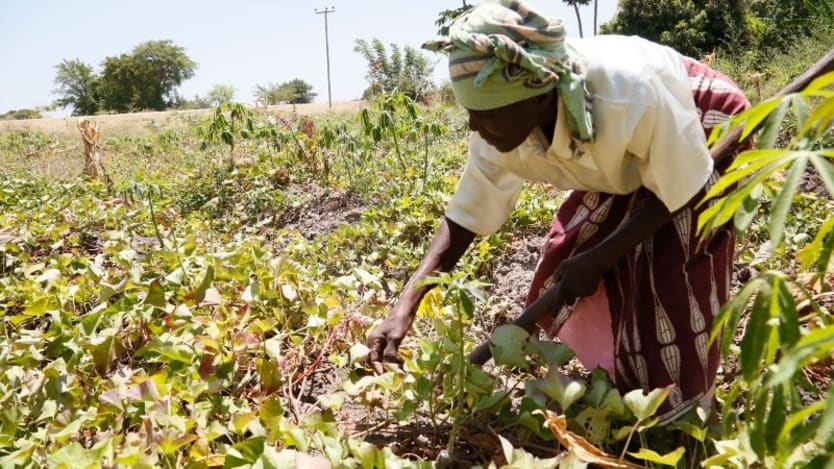
Hunger is both a cause and result of conflict. Today, around 20 million people are facing famine in Yemen, South Sudan, Somalia, and northeastern Nigeria. In fact, conflict is the main driver of hunger in most of the world’s current food crises.
Conflict breeds hunger. It can displace farmers and destroy agricultural assets and food stocks. Or it can disrupt markets, driving up prices and damaging livelihoods. In this vicious circle, conflict and a lack of food break down the very fabric of society and all too often lead to violence.
In 2018, the United Nations Security Council passed a historic resolution recognizing that hunger drives forced displacement and, conversely, forced displacement can have a devastating impact on agricultural production. Hunger will never be eliminated without global peace.
Climate change further deepens the spiral of hunger and conflict. Earlier this month, U.N. Secretary-General António Guterres pointed out that of the 15 countries most susceptible to climate risks, eight host a U.N. peacekeeping operation or special political mission. Conflict over resources such as water and arable land will only deepen if resources become scarcer.
From vicious circle to virtuous cycle
With the U.N. Food Systems Summit later this year, there has never been a better time to examine how food systems — the way food is produced, processed, transported, sold, and consumed — can drive peace and how peace can help support strong food systems.
On Feb. 16, the International Fund for Agricultural Development is hosting a pledging session for its 12th replenishment, and it has called on donors to significantly increase their contributions.
This would allow the organization to deliver an overall program of work of at least $11 billion from 2022 to 2024 to address rural poverty and hunger, including through a new private sector financing program and an expansion of its pioneering climate change adaptation program, or ASAP+.
It’s obvious that there is a problem with our food systems. While we produce more food than ever before, 2 billion people still go hungry or don’t get enough nutritious food. The carbon footprint of food production is significant, and so is the pressure agriculture puts on water resources, with agriculture accounting for 70% of freshwater withdrawals. And agriculture is the main driver of biodiversity loss. At the same time, one-third of produced food is wasted or lost after harvest, before it even reaches the consumer.
It doesn’t need to be this way. We need to turn this vicious circle into a virtuous cycle so that food systems can promote peace, which in turn promotes the supply of safe and nutritious food.
Small farms are key
Small-scale farming is key to food systems that contribute to peaceful and healthy communities. More than 2 billion people depend on the world’s 500 million small farms for their livelihoods. They have great potential to contribute more to well-functioning, sustainable food systems.
Why? Because small-scale farms mainly serve domestic and local markets. They are especially important in low-income countries, where hunger is more likely to provoke unrest.
Moreover, where small-scale farming dominates, there is more civic and social engagement, trust, and attachment to local cultures and communities. Equally important, small farms and other rural small- and medium-sized enterprises invest and spend in local economies, create jobs and opportunities — and therefore reduce the need to migrate. Where small farms thrive, resilient and peaceful communities develop.
Finally, smallholder farmers tend to take better care of the natural environment. Sustainable practices — such as organic agriculture — rely upon intricate knowledge of land and ecosystems and benefit from the long history of working the land enjoyed by family farms.
Small-scale farming systems are responsible for more than half the calories produced globally, yet ironically these farmers often struggle to feed their own families. Their land rights are often infringed, market prices and regulations frequently undermine their incomes, and they are disproportionately affected by climate change.
Investing for food and peace
In countries and situations where conflict threatens food security, short-term actions to respond to crises are not enough. Long-term development investment is key to breaking the vicious circle of hunger and conflict. In western Sudan, for example, rehabilitating, constructing, and managing water points has reduced water-based tensions between nomadic pastoralists. In Colombia, access to finance and training increased production and rural job opportunities, deterring young people from joining conflicts.
In a remote area in northern Pakistan, access to more resistant varieties of crops, veterinary services for livestock, and paved roads to access markets resulted in communities rejecting extremist influences. From these and other examples of the impact of the International Fund for Agricultural Development’s investments, it is also clear that lasting impact depends on holistically addressing the interlinkages between economic factors, natural resource management, and social inclusion.
Guaranteeing the sustainable food systems of tomorrow
Today, COVID-19 is adding to the strains on our food systems, disrupting markets and supply chains for small-scale farmers around the world and threatening peace and stability. We need these small-scale farmers now more than ever, but they also need support and investment so they can play their crucial role.
In the last quarter of 2020, IFAD and Devex hosted a virtual event series — Recovery. Rebuilding. Resilience. — to shed light on how rural communities are facing and overcoming the potentially devastating impacts of COVID-19 and other shocks to their health, productivity, and incomes.
These events, focused on gender equality, climate finance, and better nutrition, showed how long-term investments in rural and agricultural development contribute to global well-being and prosperity.
In the face of the COVID-19 pandemic, climate change, and other shocks, as well as the threat of a global economic and food crisis, this series offered an opportunity to highlight proven methods for yielding transformations that ensure a more sustainable future for all and especially for those who are most vulnerable and receive the lowest incomes.
Food systems are complex. Small-scale farmers need inputs such as seeds and fertilizer to ensure production, as well as the training and support to overcome shocks such as unpredictable weather, economic downturns, or health crises. It is also critical to ensure that the markets where their products are bought and sold keep running and to support the crucial role of women in food systems by addressing gender inequalities that impede their income-generating activities.
But there are also a host of social dimensions. The success of small-scale farmers also depends on giving a voice to their representatives — organizations of farmers, Indigenous peoples, women, and water users, as well as other community-level institutions.
At this challenging time, we must not forget how important the world’s 500 million small-scale farms are for building global peace and food security. The Food Systems Summit will be an opportunity to lay the foundations for the sustainable food systems of the future — and the peace and prosperity of future generations depend upon it.








